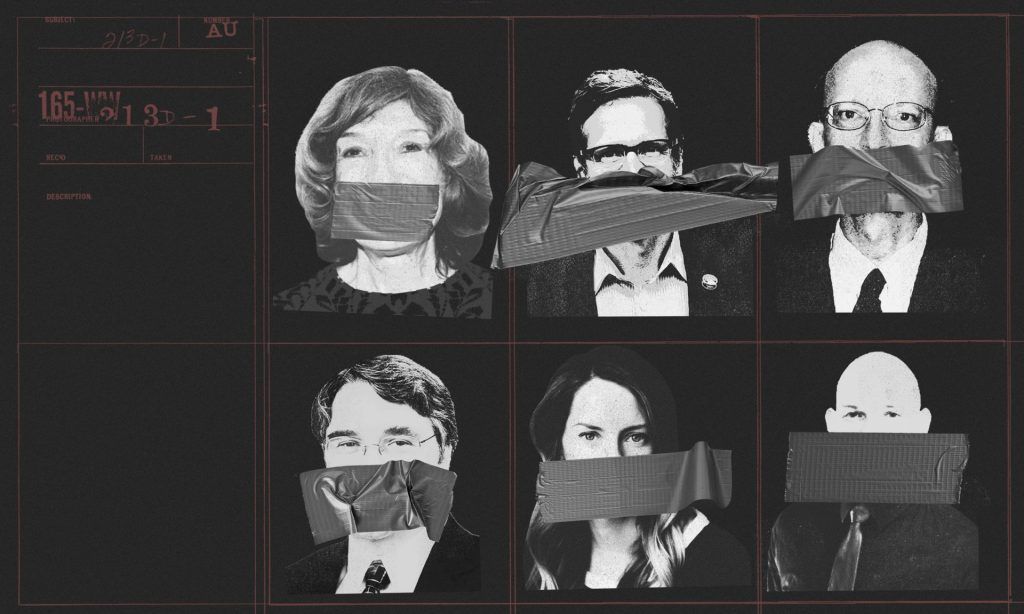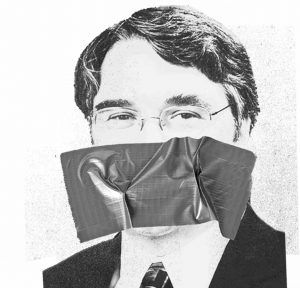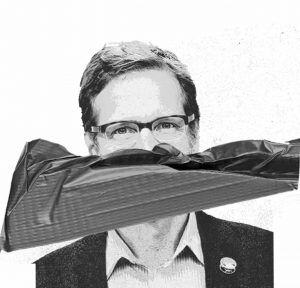Meet the climate whistleblowers muzzled by the White House
By Oliver Milman | September 18, 2019
 Six climate scientists muzzled by Trump. Illustrations by Máximo Tuja
Six climate scientists muzzled by Trump. Illustrations by Máximo Tuja
This story originally appeared in The Guardian. It is republished here as part of the Bulletin’s partnership with Covering Climate Now, a global collaboration of more than 300 news outlets to strengthen coverage of the climate story.
From weakening vehicle emissions to blocking warnings about how coastal parks could flood or the impact on the Arctic, the Trump administration is accused of muzzling climate science.
Here six whistleblowers and former government scientists describe being sidelined by the administration – and why they won’t be quiet.

Jeff Alson
Role: A former senior engineer at the Environmental Protection Agency (EPA)’s vehicles lab in Ann Arbor, Michigan
What did the work involve?
“I was an engineer at the EPA, working for 40 years in a very technical job. In 2009, after the election of Barack Obama, the EPA started working on greenhouse gas standards for vehicles for the first time. It felt like we were making history.
“There was a team of around 25 people producing thousands of pages of analysis for the standards. We knew it would be controversial but it was a very big deal, the first critical steps to address the climate crisis.”
What changed under the Trump administration?
“Once Trump was elected it became pretty clear that things would change. The president came out to Michigan in March 2017 and gave a speech where he said he’d look at the standards, that they hurt economic activity and jobs. That was an obvious sign, really.
“In August 2018 the administration proposed an eight-year freeze of the greenhouse gas standards. It was unbelievable, really – for the first time in the history of the EPA the political leadership decided to change pollution standards that were doing well without allowing the career staff and experts to play any sort of role. We were completely locked out.
“There was no scientific or technical rationale to rolling back the standards, the analysis they used was the most biased thing I’ve ever seen. They cooked the books and changed every assumption they could to get the answer they wanted. It was so bad that some EPA career staff asked their bosses to take the EPA name off it all.”
How do you feel about your experience?
“It broke my heart. I’d had this wonderful career, playing a small role in making the world a better place. Then we had a political leadership making decisions on ideology, denying science, basically being climate deniers. It felt horrible.
“I was 62 years old and there were a few family things going on, but the Trump administration made a difficult decision to retire much easier. I felt I could do more good on the outside, educating the public on what’s going on. By the time I left, the morale was the lowest I’d seen in 40 years. Our work had become irrelevant.”
RESPONSE FROM THE EPA
Asked by the Guardian on Monday about the concerns outlined by four former EPA scientists, the EPA spokesman Michael Abboud said in a statement: “The EPA under President Trump has strived to create an agency that is responsive to the American people.”
The statement said this included “proposing the Safe (Safer Affordable Fuel Efficient) rule that will save lives and produce savings for American consumers, working on the first major update to the lead and copper rule in nearly three decades.”
It added the agency was also “on track to become the first administration to complete an ozone NAAQS(National Ambient Air Quality Standards) in the five-year review cycle envisioned by Congress”, and had deleted 22 sites from the national priorities list of those eligible for Superfund cleanup, the most since the financial year 2005.

Maria Caffrey
Role: Worked on climate change at the National Park Service (NPS)
What did the work involve?
“I was studying how climate change will affect 118 coastal parks in the US for the National Park Service. I started this work in July 2013, it was my baby.”
What changed under the Trump administration?
“My study went through peer review and was ready to be released but I was told by the NPS a few days after Donald Trump’s inauguration that they were ‘waiting for messaging’ first. I thought that was no big deal but then nothing happened and I started calling up every few weeks to say, ‘We’ve got to get this out, it’s getting stale.’
“The excuses varied but became ever more vague, such as ‘we are ever so busy’ or that it would worry people during hurricane season because it mentions storm surge in coastal areas. A superior said they wanted to keep a low profile on climate change for four or maybe eight years while Trump was around, which really upset me because we don’t have four to eight years to do nothing. I felt I was being silenced.
“I went on maternity leave around Christmas 2017 and the report still hadn’t been released. I got an email from a colleague saying, ‘Congrats on the baby, by the way you should know they are editing your report.’
“We had a conference call and it became clear that any mention of human-caused climate change had been taken out. I was asked how I would feel if they didn’t release the report at all, which felt like a threat. I stood my ground and was told ‘they aren’t going to be happy about this from above.’ It was never clear who ‘they’ were – perhaps Trump himself or Ryan Zinke [the then secretary of the interior].
“I then had a meeting with a senior NPS official who came out from Washington DC. The other report co-authors were there, too. That’s when it all unravelled, it became incredibly hostile. I was told not to attribute changes in public lands to human actions.
“I felt like we worked for the American people and I didn’t want to lie to them. But a superior said that we in fact work for the executive branch of which the president is the head. The president is the boss and we are going to put our heads down and put out the line of the administration.
“A journalist did a freedom of information request and saw all the emails of us fighting over this and asked me for a statement. I ended up going on the record because I thought it was a very important issue. I was aghast I was being asked to lie. These people were violating the mission of the NPS.
“After I came back from maternity leave I was demoted to be an intern on $25,000 a year. And then in February this year they said there was no money left at all and that I would have to leave. It was devastating. I offered to work for free as a volunteer but was turned down, which shows that it wasn’t a money issue really. I packed up my office and I was gone. I filed a whistleblower complaint in July.”
How do you feel about your experience?
“I have faced retribution, I was threatened and placed in a hostile work environment. It’s clear in some agencies there’s a culture of fear where scientists are being intimidated. When I wrote this report, politics was the last thing on my mind, I was thinking about climate change and these coastal parks.
“It’s very frustrating, it’s not where I pictured where my career would be at this time in my life. I don’t even know if I have a career any more. What’s left is in tatters.”
The National Park Service did not respond to the Guardian’s request for comment.

Chris Frey
Role: A professor of environmental engineering at North Carolina State University, Frey was chairman of the EPA’s Clean Air Scientific Advisory Committee and a member of the agency’s Science Advisory Board. He left in 2018
What did the work involve?
“The Clean Air Science Advisory Committee (Casac) is required to inform the EPA administrator over air quality standards, if they are sufficient to protect public health or not [under the Clean Air Act]. The EPA’s Science Advisory Board is a much larger committee that takes on all sorts of things – clean water rules, vehicle greenhouse gas standards, rules about transparency and so on.”
What changed under the Trump administration?
“Initially there was a neglectful relationship with the new Trump administration; they seemed uninterested and the amount of scientific advisory board work dropped off. Then, from October 2018, there were the first signs of the ideological assault on scientific advice at the EPA.
“Scott Pruitt [then administrator of the EPA] wrote a memo that said that researchers that have received grants from the EPA aren’t allowed to serve on panels because of a perceived conflict of interest. But there was no prohibition on industry people serving and the number of them on the panels has increased. It’s been a way to kick qualified people off the boards and get cronies in their place.
“There was a complete turnover of Casac and it shows in meetings. They now bumble through things because they don’t understand the process and the Clean Air Act. Political appointees are interfering with the selection of candidates, essentially picking those sympathetic to the agenda of the administration, even if they have fringe views like climate change isn’t happening, that kind of stuff.
“I was on a panel looking at the risks posed by particulate matter. We had a lot more work to do but we were disbanded four days before the EPA released an assessment that we would’ve reviewed. The timing was mind-boggling. I found out by seeing a press release on the EPA website, which was followed by an email saying our services were no longer needed.
“I was also a nominee for a panel on ozone but then they said they wouldn’t go ahead with that. It was a little frustrating for me personally, but it’s more of a loss to the American public. The EPA has always been thought of as a science-based agency; what we see now is no basic respect for science.”
How do you feel about your experience?
“There’s not even lip service to the science. Science can’t be controlled like ideological spin, so the administration is afraid of that. They don’t want scientists and their evidence-based opinions – they’d rather have cronies trot out the same tired talking points on fringe scientific views.”

Joel Clement
Role: An expert on the impact of climate change on the Arctic at the Department of the Interior
What did the work involve?
“I was at [the department of the] interior for nearly seven years. I started on 3 January 2011 – I know the exact date because of how excited and inspired I was at the thought of serving in the federal government. I was hired as a senior executive to run the office of policy analysis, which sits in the office of the secretary.
“One of the main areas of focus was addressing the impacts of climate change in the Arctic, which is warming two to three times faster than the rest of the planet. Entire Alaska native villages are threatened by rapid coastal erosion and storms because they no longer have a sea ice curtain to protect them from fierce Arctic storms in the fall and early winter, and the ground beneath their feet is falling away as the permafrost thaws.”
What changed under the Trump administration?
“The new Trump team was very thin and most of them knew very little about the agency mission – they were mostly oil and gas lobbyists and some campaign workers. Whatever they were talking about up on the secretary’s hallway, it sure wasn’t being shared with the career staff at the agency. So you basically had 70,000 employees scratching their heads and getting back to doing their jobs while a couple dozen political appointees tried to get their act together to lead them. It was surreal.
“But this neglect soon turned into scorn, characterized by comments from the new secretary, Ryan Zinke, that the staff were disloyal. Morale began to quickly plummet as the political ranks showed not only ignorance of, but disdain for the wide-ranging agency mission. Here you had tens of thousands of people working hard in public service and being told what they do is not important.
“The National Park Service and Fish and Wildlife Service had it worst because they didn’t have anything to do with oil and gas or mining permitting process, and the lobbyists in charge had no interest in wildlife, conservation or biodiversity.
“But every agency suffered, because the mantra of the administration was to drain the swamp – and it quickly became clear that the swamp was not the high-paid lobbyists, but the rank-and-file government professionals who serve the country.
“On a Thursday night in June, just a week after I’d been in New York to speak at the United Nations about climate change adaptation issues, I received an email that said I was being moved to a new position.
“It was quickly obvious that this was a retaliatory action, as I was moved away from any climate change work to the office that collects royalty income from oil, gas and mining companies – an auditing position for which I had zero expertise. The email explained that because I had economists on my policy staff that I must clearly know about numbers, so I’d be good in an auditing office.
“I’d heard that they were looking for a job that I would not want, in hopes that I would quit. It’s not unusual for senior executives to be reassigned, it’s part of the job, but reassignment can’t be used to get people to quit – and Secretary Zinke testified to Congressa week later that he was using reassignments, among other methods, to trim the workforce. Sadly, I was only one of dozens of executives who were reassigned that night, many of us for clearly retaliatory reasons.
“I found legal counsel and eventually filed a whistleblower complaint and went public with an op-ed in the Washington Post. I wasn’t worried too much about my job at that point, I was worried about the work I’d been doing on behalf of Alaska Natives, and it was clear they had no intention of continuing to work to help those frontline communities.
“A couple months later I decided that they’d already taken my job, but there was no way I’d let them take my voice, so I resigned and continued to speak publicly about these abuses and the implications for American health and safety.”
How do you feel about your experience?
“The Trump administration is threatened by evidence, by science and by expertise. These things interfere with their ability to hobble government agencies and reduce oversight. It’s mind-boggling and a profound threat to democracy but it also increases risks to American health and safety. Every American should be concerned, regardless of political stripe.”
RESPONSE FROM THE INTERIOR DEPARTMENT
A Department of the Interior spokesperson said in a statement to the Guardian: “The department works to ensure that the scientific activities that it carries out use the best science and are the result of robust and independent processes.”
The department said it was required by law to research and publish reports regarding the changing conditions of the climate and has a “rich and longstanding culture of scientific integrity that prevails independently of individual administrations”.

Betsy Southerland
Role: A long-term water quality official at the EPA
What did the work involve?
“I was at the EPA for 33 years, starting in 1984. I worked in the water program and on Superfund cleanups, working on the criteria for drinkable water.”
What changed under the Trump administration?
“I left in August 2017 and made a very public retirement statement about how bad this administration is and its assault on science. It went viral and since then I spend 20 to 30 hours a week helping the press and Congress understand the impact of what the Trump administration is doing.
“We’ve never seen anything like this complete abandonment of science, solely to maximize corporate profits. Everything changed after the election. The climate change section of the EPA website came down and Scott Pruitt came in and brought in a bunch of political appointees who didn’t need Senate confirmation.
“I was working on a chemical safety rule that was rewritten by Nancy Beck, someone from the American Chemistry Council [an industry lobby group] who Pruitt brought in. It basically repeated the talking points she used on the chemistry council.
“Pruitt never spoke to any of the career staff before he made decisions on replacing rules. I worked on a rule that would require coal-fired power plants to treat toxic waste rather than simply dump it into leaky ponds. Pruitt met with Bob Murray [head of the coalmining firm Murray Energy Corporation] and decided to postpone the rule and the first we knew about it was when we were asked to check a draft press release about the rollback.
“Scientists are really irrelevant at the EPA now, their input isn’t requested. They are simply directed by the political team to help fulfill the desires of political donors, no matter the cost to Americans. At the moment it’s just a logistical question of how fast they can go on this. They have something like 70 regulation repeals under way and because it will be hard to do this with legal challenges they want to undermine the underlying science.”
What happened after you left?
“Within a couple of days of me leaving an opposition research firm did a freedom of information request for all my emails and the EPA immediately handed them over. I found out they made a big effort to connect with all the rightwing media to trash me. They made up this lie that I was being paid more than a Congress member for every year of my retirement. It got really ugly, so I got off social media.
“The same opposition group then tried to find out if any EPA employees donated to [Bernie] Sanders or [Elizabeth] Warren. It’s stunning to target federal employees like that. I’ve never seen that before.”

Jacob Carter
Role: Worked on climate change impacts upon Superfund sites (toxic areas requiring federal cleanup) at the EPA
“I was brought in by the EPA to do climate change work for the office that oversees the Superfund site program, which are toxic areas that require a federal cleanup.
“I was specifically working on the Superfund site program because President Obama had issued an executive order for any federal agencies that would put forward new federal dollars into infrastructure. Essentially, he wanted those agencies to incorporate climate change into flood risk for that infrastructure.
“The model essentially looks at how much sea level rise is expected over the next 100 years. Plus what did the extreme floods look like in those areas? And I combine those two sets of data to create a model that is predictive of these future extreme floods that we’re seeing more of currently and are expected to see more of in the future.”
What changed under the Trump administration?
“I knew from President Trump, then candidate Trump’s campaign, how he felt about climate change, that I was likely on the chopping block because I was a postdoctoral fellow and my contract was sort of on a year-to-year basis.
“And so after the transition occurred, I was there for a couple of weeks and then one day my boss came to my office and said: ‘I think you should probably start looking for another position.’”
How do you feel about your experience?
“It was a very difficult time for me, absolutely. I was extremely sad and depressed. I really liked the work that I was doing. I felt like I was doing research that was really going to have a significant impact.
“I had worked really hard on it. To see something like that just get sort of tossed out the window was really disheartening to see. And the fact that they were just going to completely dismiss this climate change work altogether was also really disheartening. So, yeah. It was a very sad time for me. I will not lie.
“There’s a ton of different scenarios that have occurred that show that this administration really does not care about progressing climate change or climate science, in general.
“I mean, any time you see some sort of report come out of the agency that even mildly mentions climate change and maybe its impacts to national parks, or something to that extent, the administration tries to downplay human connection to climate change. They try to downplay the role of climate change and federal scientists’ work in press releases.
“They try to downplay the role of climate change and research that they’re funding. So even in grants that the agencies are receiving, they’re now being vetted by political officials to essentially make sure that climate change is not mentioned in those proposals. It’s not a great time to be a climate change scientist in the federal government.”
Additional reporting by J Oliver Conroy
Illustrations by Máximo Tuja

Together, we make the world safer.
The Bulletin elevates expert voices above the noise. But as an independent nonprofit organization, our operations depend on the support of readers like you. Help us continue to deliver quality journalism that holds leaders accountable. Your support of our work at any level is important. In return, we promise our coverage will be understandable, influential, vigilant, solution-oriented, and fair-minded. Together we can make a difference.














